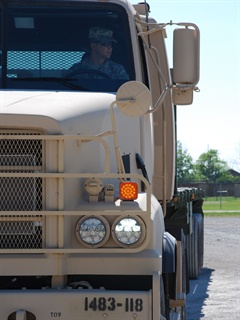FMCSA Proposes Younger Driver Pilot Program for Former Military

The Federal Motor Carrier Safety Administration is proposing a pilot program allowing a limited number of drivers between the ages of 18 and 21 to operate commercial motor vehicles in interstate commerce if they received specified heavy-vehicle driver training while in military service and are sponsored by a participating motor carrier.
The program is required by the Fixing America’s Surface Transportation (FAST) Act.
During the three-year pilot program, the safety records of these younger drivers (the study group) would be compared to the records of a control group of comparable size, made up of drivers who are 21 years of age or older and who have comparable training and experience in driving vehicles requiring a commercial driver’s license. The control group would consist of volunteer drivers who meet specified criteria and are employed by a participating carrier. The comparison of the two groups’ performance would help to determine whether age is a critical safety factor.
FMCSA is also proposing criteria for a working group to consult with the Agency in conducting, monitoring, and evaluating the pilot program.
The agency notes that while there has been opposition to previous proposals to allow younger drivers to driver in interstate operations, many intrastate commercial vehicle drivers are already in this age group. But FMCSA is not aware of any studies or published reports comparing their safety performance with that of drivers over 21, either interstate or intrastate. This pilot program would provide much-needed data on the issue.
To have a statistically valid sample of drivers under the age of 21, approximately 200 study group participants are desired. When these individuals reach the age of 21, they would no longer participate in the pilot program and would be replaced by new study group members meeting the eligibility requirements.
Participating carriers that meet the qualifications would sponsor study group members and perform other duties related to the pilot, such as filing certain reports and recruiting existing drivers to participate as control group members. Carriers would be required to install and operate electronic logging devices (ELDs) on all vehicles operated by study and control group drivers. Data from these devices, such as vehicle miles traveled, is essential to analyze driving safety records, the agency notes.
The agency seeks public input during the next 30 days on the pilot program as well as outlined procedural steps and a data collection plan. Comments and data received from the public will be used to further develop the program.
Click here to read the Federal Register notice and provide comments.
Follow @HDTrucking on Twitter
